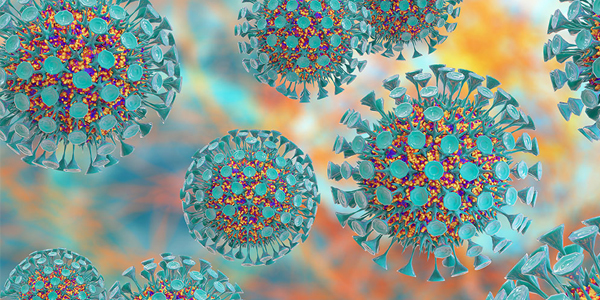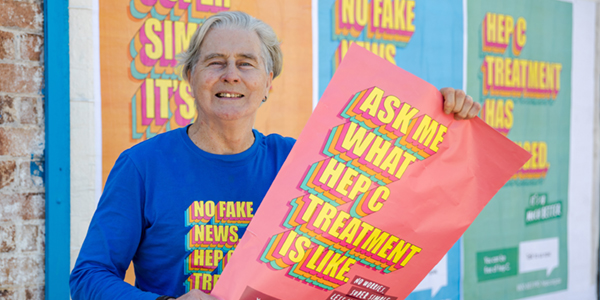The Champion #101 – November 2021
This issue:
- New report shows sustained investment is needed to eliminate hep C by 2030
- Advocacy against Australian Federal Police stigmatising campaign
- Calling all hep C peers!
- Hep C Cure Bootcamp – Let us know your story!

New report shows sustained investment is needed to eliminate hep C by 2030

A new national report released in October by the Burnett Institute and Kirby Institute has highlighted a decline in hep C testing and treatment uptake. The report – Australia’s progress towards hepatitis C elimination 2021 – notes that, although there has been some good progress in earlier years, the current trend puts Australia at risk of not achieving its target of eliminating hep C as a “public health threat” by 2030.
There was a decline in testing, in 2020, for both hep C antibody and for RNA testing (used to detect current infections).
The report adds that the same trend has been observed for the uptake of direct-acting antiviral (DAA) treatment for hep C. Unfortunately, 2020 was the first year since the start of the DAA program where less than 10,000 people were treated. Critically, COVID-19 is likely to have impacted both testing and treatment uptake. It is a impact that can expected to feature in testing and treatment rates in 2021 also.
Since DAA treatments were introduced in 2016, close to half of the people living with hep C at that time have now been treated. However nearly 120,000 Australians still need treatment. There is an urgent need to engage with this group who have not accessed treatments and some of whom may not know they have the virus.
There is a need to find additional innovative ways to engage with communities, and to look at how we help those who have hep C – undiagnosed and diagnosed – to get care. This includes simplifying access to treatment, addressing stigma and discrimination and extending the use of peer workers to better reach priority groups.
The report’s findings highlight the need for immediate and sustained investment in community, education, and clinical programs to increase hep C awareness, testing and treatment. Modelling outlined in the report shows these type of investments would be highly cost-effective in the long-term.
Maintaining the same testing and treatment rates from the last five years up to 2030 would help prevent 15,700 new infections and 8,500 deaths over 2016–2030. Economic modelling in the report indicates current investments would become cost-saving by 2022 and go on to have a net economic benefit of $5.7 billion by 2030.
However, scaling-up testing and treatment is required to reach hep C elimination targets by 2030. It would also avert an additional 10,000 new infections, increasing the net economic benefit at 2030 by a further $272 million.
With strategic investment and concerted effort Australia can eliminate hep C by 2030. Centring on people impacted by hep C will be critical to this achievement. A comprehensive response is needed including prevention, harm reduction, testing, diagnosis, treatment, and post-cure support.
Australia has a once in a generation opportunity to eliminate a disease that is a leading cause of liver cancer. We must ensure that no one is left behind in achieving the goals of the National Hepatitis C Strategy.
- Read Australia’s progress towards hepatitis C elimination >>>CLICK HERE
- Read original Burnett Institute media release >>>CLICK HERE
Advocacy against Australian Federal Police stigmatising campaign

A recent Australian Federal Police (AFP) social media campaign, run over the Halloween period, has caused major concern across the BBV/STI sector and community. The campaign, using imagery and text in Facebook posts, encourages stigma and discrimination by perpetuating stereotypes about people who inject drugs and reinforcing old, misguided beliefs about drug use in general.
Peak national BBV/STI agencies – led by Hepatitis Australia and AVIL – has written to the Australian Federal Police Commissioner requesting that the four stigmatising Facebook posts be removed. We have not reproduced the posts alongside this article, as they are appalling.
The letter – co-signed by the CEOs of Hepatitis Australia, AVIL, NACCHO, ASHM, AFAO, NAPWHA, APSAD and Scarlet Alliance – asserts that the Facebook posts, in addition to their stigmatising content, were not consistent with Australian drug and health policy or scientific evidence. The National Drug Strategy 2016-2027 is premised on a strong partnership between health and law enforcement/justice portfolios, and states that:
“…it is also important that any responses do not inadvertently or unintentionally further marginalise or stigmatise people who are at higher risk of experiencing alcohol, tobacco and other drug related harm.”
An underpinning principle of The National Drug Strategy is evidence-informed responses. The letter makes clear the posts made by the Australian Federal Police contradict the evidence of what works including the prevention of drug-related harms, engaging people in care, and in health promotion and communication.
Furthermore, the five National Blood Borne Virus and Sexually Transmissible Infections Strategies 2018-2022, endorsed by all Australian Health Ministers, include people who use drugs as a priority population and commit to eliminating the negative impact of stigma. The posts made by the AFP undermine the communicable disease elimination efforts of these national strategies.
To achieve the goals of these national strategies it is critical for people who use drugs and their families and friends to feel safe and come out of the shadows to engage in prevention, harm reduction, treatment, and support.
This type stigma is precisely what all hepatitis organisations across Australia are working against. It is impossible for us to achieve our viral hepatitis (particularly hep C) empowerment and elimination goals with this kind of harm being perpetuated by such a high profile, visible, influential, and powerful organisation like the AFP.
Hepatitis Australia is liaising with Commonwealth officials, including the AFP Commissioner’s office, about the campaign, with further action planned by Hepatitis Australia and our BBV/STI sector partners.
Calling all hep C peers!

Hepatitis NSW has an exciting opportunity for people with lived experience of hep C to get paid for helping to make hep C history. Our hep C peer partnership program is looking for peers to join our growing team.
All you need is to have had hep C and been cured, good people skills, and enthusiasm for encouraging people to get tested and get cured of hep C. Your life experience is expertise. We don’t need a résumé or qualifications; all we need is a passion for helping others get cured of hep C.
And if you know someone in your orbit, please send them our way. Or if you work at a service and want peer workers to enhance your hep C work, please also get in touch.
Peer workers work together with nurses and health staff at various locations all over NSW such as methadone clinics, homelessness services, residential rehabs, and community health centres. We’ve got a need for peer workers across the state so please get in touch.
The positions are well-paid, well-trained, rewarding, and will play a vital role in ending hep C in NSW by 2028.
For more information, check out the peer partnership program >>>CLICK HERE
If this sounds like something you’d be interested in, please contact Kyle:
email: [email protected]
phone: 02 8217 7707
Hep C Cure Bootcamp – Let us know your story!

Not that we’re hounding you about this… but did you start on our “patented” Hep C Cure Bootcamp Plan after reading about it in the September Champion?
If you did (or are about to) we’d love to hear how you (or maybe a friend) went. Send in your story by January 15 2022 and you could win a $100 Coles/Myer gift voucher. Email to: [email protected]!
Most people in NSW can now test, and start treatment, for hep C without having to leave home. Hep C Cure Bootcamp uses the self -collected DBS testing kit, Telehealth calls with the doctor to get treatment started, and e-scripts by text or email to your pharmacy to make getting hep C cure medicines and repeats easier. Once you’ve started treatment , the free Perx treatment support App will help keep you on track, giving you incentive vouchers each step of the way. Treatment takes 8 or 12 weeks.
It’s not too late to make curing hep C your best New Year’s resolution ever. Hep C Cure Bootcamp gives you tips to get through the process smoothly, with less trips to the doctor and more time to…. well… do less! You could start now and be clear of hep C by early 2022!!
Tell us about your Hep C Boot Camp experience, by January 15 2022, and you could win a $100 Coles/Myer gift voucher. Winner will be published in our blog… email to: [email protected]!









